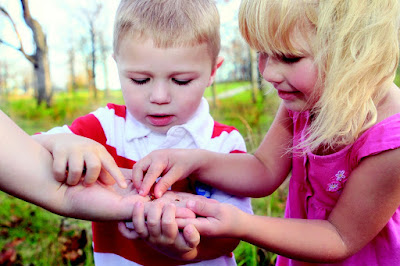Tuesday, August 8, 2023
It’s good to be curious and question what you don’t know as it’s how we learn and develop understanding. It also allows us to make smarter choices as opposed to taking what we’re told at face value. Parents can help children think for themselves by developing their curiosity and encouraging them to question the world around them. Below is some guidance from a private nursery in Notting Hill on how to raise an inquisitive child.
1. Verbalise Your Curiosity
If your child’s not yet asking questions, prompt them to think in a curious way by questioning what you see and verbalising your curiosity.
2. Ask Questions
You can also do this by asking them questions and encouraging them to consider alternative points of view.
3. Nurture Their Curiosity
If on the other hand your child’s overly curious and has plenty of questions to ask, it’s important that you acknowledge them. Nurture their curiosity by attempting to answer their questions or set them on a task to figure them out. If however you’re dismissive, your child may refrain from asking and not be able to explore their curiosity in the same way.
4. There’s No Such Thing as a Stupid Question
To follow on from the point above, your child should know that there’s no such thing as a stupid question. It’s how we learn, and they shouldn’t feel embarrassed for being brave enough to ask and highlight a problem no one else has yet identified.
5. Never Lie
If you don’t happen to know the answer to their questions, use it as an opportunity to learn together. What you don’t want to do is lie as this can create confusion and trust issues later down the line.
These are just a few ways to get children thinking and help them with their curiosity. What you can also do is introduce them to new ideas and ways of doing things which will broaden their horizons and demonstrate the need to think differently and inquisitively.
At school children have the option to choose from a wide variety of subjects such as performing arts where they can explore acting and other talents such as singing and dancing. In addition to the skills mentioned, it can help immensely with their confidence and abilities such as emotional intelligence. Below are some key points shared with us by a performing arts school in London on how the subject can be beneficial for children.
Confidence
Children need a degree of confidence to perform in front of others and is gradually built up through stage experience. Through the process they can learn to manage their nerves and become used to presenting themselves.
Body Language
To act well, children must have a good grasp of body language and understand how to replicate certain emotions. This can make them better readers of body language.
Communication Skills
Performing also relies on good communication skills both on and off stage. Children must work effectively with others and communicate clearly and effectively when reading their lines.
Teamworking
Going back to the point above, there are several components to putting on a good performance and children who are acting must learn to work with an entire team.
Build Other Skills
Performing presents children, the opportunity to explore other talents such as singing and dancing.
Strengthens Memory
For shows that they put on, children must remember their words, and choreography if they are dancing. This relies upon and promotes good memory.
Problem Solving
In the event that a problem arises, or they forget their words, children may need to improvise and use their problem-solving skills. This teaches them how to respond to issues calmly and effectively.
There are of course some great benefits to studying performing arts. For children to see full benefit, it should be something they actively want to pursue.
Depending on how far you live, your child may need to take the school bus. This can be a big step, especially if they have not gone anywhere by themselves before. To help with the nerves and ensure that everything runs smoothly, here are some tips put together by a private school in North London.
Build Their Excitement
Travelling to school alone is a big step and something your child should be proud they can do. So that they aren’t so scared, build their confidence and excitement by reassuring them that they will be okay and use praise.
Do The Journey with Them
If you’re worried about how they will adjust, you can always do a few journeys ahead of time using public transport. This will give them an idea of what to do when they get on and off the bus and make the step seem less scary.
Find Them a Buddy
If you know of any other children taking the same school bus, why not speak to their parents and find them a buddy. This can help make things a little less scary and give them a friend to talk to on their travels.
Prepare for The Unexpected
There are also unexpected events that your child will need to be prepared for, such as the bus not turning up. Talking about what to do in these circumstances can help children feel less afraid and promptly make a decision about what to do, e.g., calling their parents or finding an alternative means of transport.
Stranger Danger
Sadly, there are dangers that children must be warned against, such as speaking to strangers. This isn’t so much an issue if the school bus will take them straight to school from near home but is something they should be taught regardless.
Depending on what the route looks like for your child and their exact mode of transport, the steps you will need to take will vary.
As we’re all aware, climate change is a growing concern, and we must all do our bit to protect the planet. Children should be educated on the matter and do their part as well as adults and is especially important now as it is central to how we go about day-to-day life. Below is some advice from an independent school in Warwickshire for parents.
Explain Why They Must Be Environmentally Responsible
Start by explaining the importance of environmental responsibility and the challenges the planet’s facing. This will help them understand why more must be done and encourage them to do their bit.
What You Can Do as a Family
There are a number of things that you can start doing as a family to reduce your carbon footprint, such as turning electronics off when not in use and switching them off at the mains as opposed to leaving them on standby. Travel is another area to look at. While it’s convenient, driving adds to air pollution and burns finite fossil fuels.
The journey to and from school is one families do almost daily, with the exception being the school holidays and the weekends. By cutting down on these trips, you can minimise harm done to the environment and also instil healthy habits.
Upcycling Projects
We’ve become extremely wasteful as a society. Instead of mending items, we throw them away. Materials such as plastic have a long-life span and can be used again with a little creativity. You can work on projects and look at how irreparable items can be upcycled into new pieces. Milk bottles for example can be turned into watering cans for the garden, and old knits can be used to recreate new garments.
Set a Good Example
For children to go out of their way and do their bit, they need a good role model to set an example and champion them to do the right thing. Even making use of services such as http://sellformula.com/ and telling your children about this is a great way to lead by example.
Upcycling Projects
We’ve become extremely wasteful as a society. Instead of mending items, we throw them away. Materials such as plastic have a long-life span and can be used again with a little creativity. You can work on projects and look at how irreparable items can be upcycled into new pieces. Milk bottles for example can be turned into watering cans for the garden, and old knits can be used to recreate new garments.
Set a Good Example
For children to go out of their way and do their bit, they need a good role model to set an example and champion them to do the right thing. Even making use of services such as http://sellformula.com/ and telling your children about this is a great way to lead by example.
Subscribe to:
Posts (Atom)
Blog Archive
- July 2024 (8)
- June 2024 (6)
- May 2024 (2)
- April 2024 (5)
- March 2024 (3)
- February 2024 (7)
- January 2024 (14)
- December 2023 (10)
- November 2023 (1)
- October 2023 (5)
- September 2023 (1)
- August 2023 (4)
- July 2023 (6)
- June 2023 (5)
- May 2023 (2)
- April 2023 (5)
- March 2023 (1)
- February 2023 (4)
- January 2023 (6)
- December 2022 (6)
- November 2022 (4)
- October 2022 (6)
- September 2022 (9)
- August 2022 (6)
- July 2022 (2)
- April 2022 (1)
- March 2022 (1)
- February 2022 (2)
- January 2022 (1)
- December 2021 (2)







Social Media
Search